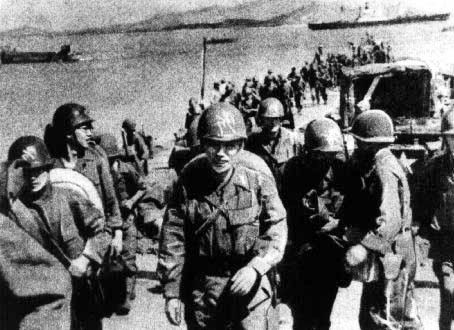Surge Successess And Surge Failures
 About a dozen years after a "surge" of US troops landed in Inchon, Korea in Sept. 1950, our own ship entered the bay and tied up at the city's docks.
About a dozen years after a "surge" of US troops landed in Inchon, Korea in Sept. 1950, our own ship entered the bay and tied up at the city's docks.I wasn't a soldier; I was barely in double-digits. Dad was Assistant Naval Attache at the embassy in Tokyo, and a cruise on a Military Ship Transport Service "liner" to Korea was the family's idea of a vacation.
Landing in Inchon was a history lesson. I learned how a coordinated amphibian landing brought the power we needed quickly to the front of the war, turning the tables. Today, reading Victor Davis Hanson, I learned a bit more about Inchon and surges:
In the first dark months of the Korean War, Gen. MacArthur increased U.S. troop strength for the September 1950 Inchon assault. But that dramatic breakthrough and recapture of Seoul came as a result of risky amphibious operations — not just more boots on the ground.Hanson's point: It wasn't the increase in troops that turned the war; it was in increase and a brilliant and risky change in tactics. He writes also of Gen. Foch in the trench war of WWI and Sherman in the Civil War, both of whom benefitted from troop surges, but turned the war by fundamentally, and unexpectedly, changing tactics as the new troops surged in.
Conversely, Hanson points to Vietnam, the Union Army in Virginia and (typical Hanson) the Athenians under Demosthenes in Sicily in 414 B.C. as examples where troop surges failed to change the course of the war.
As we await Pres. Bush's scheduled announcement on new Iraq war tactics next week, our fear is that a troop surge will result in more of the same at a larger scale in this difficult war. Hanson lays out yet another set of points (we've seen so many of these lately) that he hopes will make this surge more like Inchon and Flanders and less like Mekong and Sicily. I won't repeat them; you've read similar ideas before and probably had most of them all by yourself.
The point is not to define the tactics for the Administration, but to encourage the Administration to incorporate a surprpisingly bold set of new tactics into the new war plan. We should not be told all of them in advance, of course. One of Gen. Foch's changes was to gain surprise by attacking after shorter artillery barages. The war had settled into a pattern of long barrages; he changed the tactic and the surprise helped him prevail. So if we are to have brilliant new strategies for Iraq, we should read about them long after they're carried out, not next Wednesday on the blogs.
If all there really is to the plan is a troop surge, God bless the soldiers and God bless America. They and we are going to need it more than ever.
Hat-tip: Real Clear Politics
Related Tags: War on terror, Iraq, Bush




<< Home